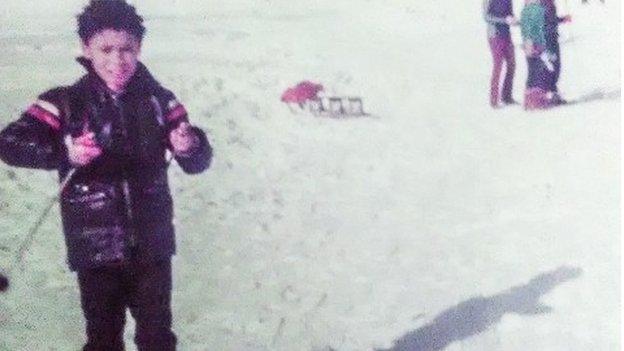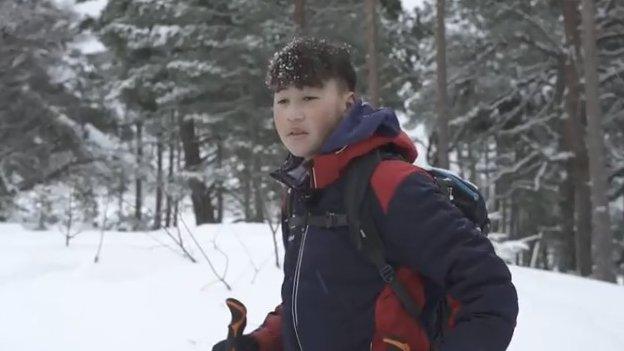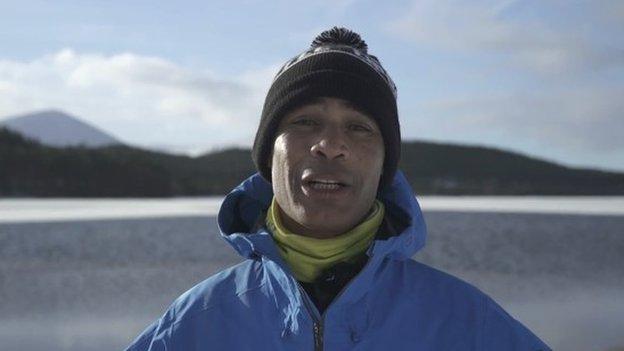Ski Sunday: Why are there so few BAME skiers and snowboarders?
- Published
Ski Sunday: How do you solve snowsport's diversity problem?
Phil Young is a snowboarder, cyclist, trail runner and general lover of the outdoors who presented the cult 1990s TV show Board Stupid on Channel 4. He is passionate about diversity and in this week's Ski Sunday asks why some ethnic groups are so under-represented in the ski and snowboard industry - and what is being done to encourage people from BAME backgrounds to participate.
On paper the chances of a mixed-race child of the 1970s getting involved in the snowsports scene are pretty slim. I was born in Enfield in north London and spent my youth in a nondescript suburb where sliding down the hill behind the squash courts on a plastic bread crate was the closest I got to winter sports.
Then when I was a teenager, my grandparents decided to go skiing in Italy and I would be going with them. It was the first and only time they indulged in this type of behaviour but it served to ignite a fire in me that has only burnt brighter over the years.
I experienced for the first time something I had only seen in photographic books.
I remember crying on the way home from the resort of Macugnaga in the Alps thinking I wouldn't get to experience it again. I was blown away by the size and beauty of it all, the speed of flying down a slope only half in control excited and amazed me in equal measure.
Thankfully, I have been given the opportunity to go back to the mountains on numerous occasions since my first visit, transitioning to snowboarding when it emerged in the late 1980s, fully immersing myself in the wonderful, friendly, often loose scene that has grown up around it.

Phil on his first ski holiday in the Italian Alps
My professional life saw me presenting a snowboard TV show as well as working with some of the greatest riders ever to have done it, getting to travel across the globe to poach turns on some of the best snow on the planet.
Over the years, progression in the various sports has been nothing short of remarkable. Technology is now making it much easier and cheaper to learn which in turn has enabled tricks to become feats of gymnastic proportions.
And with fantastic resort facilities, it has never been more achievable for those who want to make it big.
But a couple of things have stayed the same; the majesty of the mountain landscape remains as awe-inspiring as ever, albeit with a retreating glacial presence. And there is still an almost total absence of non-white faces.
There have been a handful of people who have made a name for themselves at the top level including the ultra-talented American snowboarder Keir Dillon, while Ghanaian skier Kwame Nkrumah-Acheampong, external competed at the 2010 Olympics.
But the barriers for black and brown people start at grassroots level and in my opinion owe much to questions of acceptance and belonging in rural spaces.
On Ski Sunday I touch on how the Windrush generation essentially became urbanised, forced into large cities and in the process losing an understanding and emotional attachment with the natural world.

Fergus moved to Scotland from Africa when he was three
This is compounded by outdoor brands who up until recently have felt compelled to frame any reference to people of colour through a lens backdropped by high-rise housing blocks or walls emblazoned with graffiti rather than out in the wilderness.
On the show I meet Fergus, a bi-racial 14-year-old born in the Kingdom of Eswatini, a former British Protectorate once known as Swaziland.
Fergus now lives in the Highlands of Scotland where the mountains are his playground. He loves everything about skiing and this winter had the opportunity to go pretty much every day, often hiking two or three hours to get his fix of powder turns.
Whether he realises his dreams of one day skiing for Scotland to my mind is irrelevant, what matters is that he has a dream to chase in the first instance.
What is important is that he can see a place for himself in the landscape, unapologetically carving a space for himself in the natural environment.
Fergus has been protected by an amazing family and local community away from racism. There is an innocence about him that I fear will sadly one day be broken when he leaves the security of his small village.

Phil Young presented Board Stupid on Channel 4 in the 1990s
Vicky Gosling, who is chief executive of GB Snowsport, admitted a lot of work needed to be done and told me there is a Nielsen survey being conducted to understand what is preventing minority groups from seeing snowsports as a viable option.
While I celebrate this announcement I feel obliged to question why it's taken close to the 40 years since I first went to the mountains for any action to be taken.
Granted it's been a blind spot for practically all rural sports, but to find ourselves in 2021 with zero data around ethnic participation and with no published targets or timelines, I consider myself justified in feeling cautious.
Skiing and snowboarding isn't cheap and many of us don't live close to the mountains but the black and brown community has a growing middle class looking for new experiences on which to spend their money.
To move towards a place where new faces feel as though they belong, where they can bring new ideas, revenue and performance, we need to revisit how we sell the sport.
Brands, organisations and resorts need to find new ways to reach out and speak to new audiences in language and imagery that engages people outside of the traditional demographic.
And any sport that wants to remain relevant and hold its own on the world stage, attracting big cash sponsors, also needs to commit to adapting to the changing make-up of the UK.
Watch the film on Ski Sunday on 21 February, 1915 GMT on BBC 2 and iPlayer.

Eating With My Ex: Celebrity Specials: Famous exes come face to face to answer some awkward questions
Line of Duty series 1-5: You won't be able to stop watching this nail-biting show
